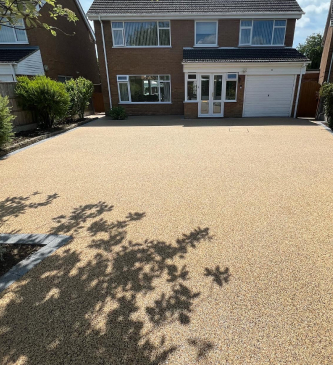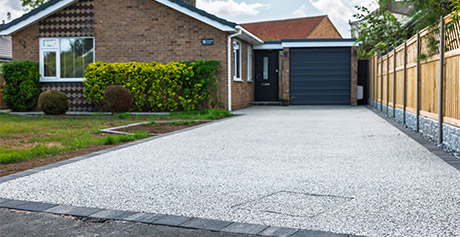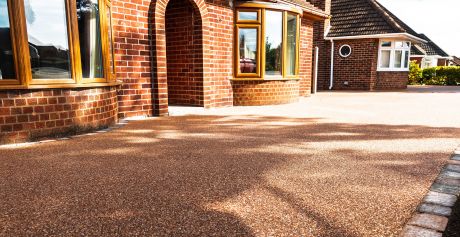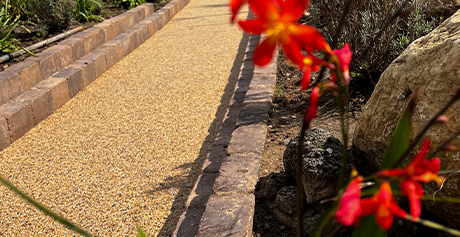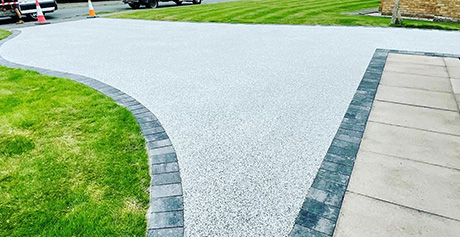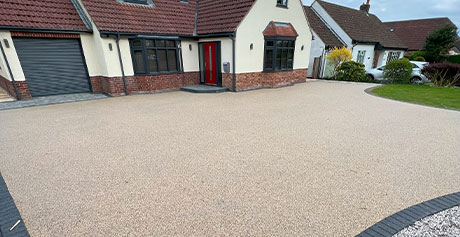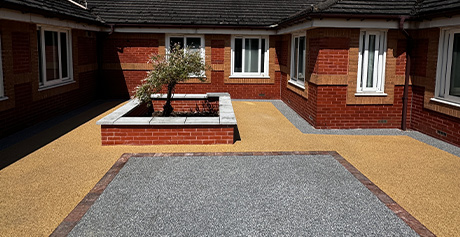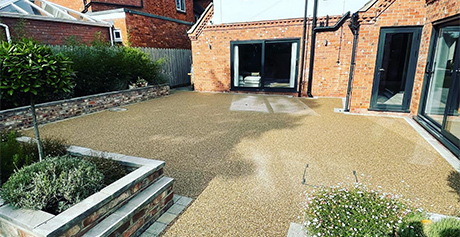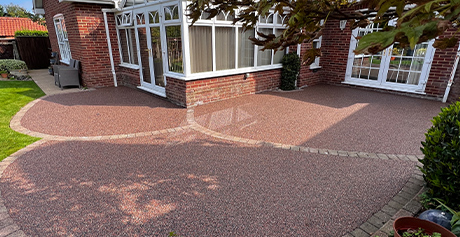Our Resin Driveways Guide
Resin driveways are rapidly becoming the go-to choice for homeowners seeking a blend of aesthetic appeal, durability, and eco-friendliness. These driveways utilise a mix of resin and aggregate stones to create a smooth, permeable surface that’s both visually striking and functional.
Resin Driveways Overview
Resin driveways, known for their durability and versatile design options, offer a sustainable and attractive solution for modern driveways. The unique composition allows for a wide range of colours and textures, making it a popular choice among homeowners looking to enhance their property’s curb appeal.
Installation Process
The installation of a resin driveway involves several key steps to ensure a long-lasting finish:
- Surface Preparation: Removing vegetation, debris, and ensuring the base is clean, dry, and stable.
- Mixing and Pouring the Resin: Blending resin with aggregates and applying it evenly across the prepared surface.
- Curing and Finishing: Allowing the resin to harden, followed by any final touches to achieve the desired appearance.
Types of Resin Driveways Guide: Bound vs. Bonded
Resin driveways come in two main types – resin bound and resin bonded. Resin bound driveways feature a mixture of resin and aggregates applied together, creating a permeable, smooth finish.
In contrast, resin bonded driveways have a layer of resin applied to the surface, with aggregates scattered on top, resulting in a non-permeable, textured finish.
Planning and Regulations
When installing a resin driveway, it’s crucial to consider planning permissions and regulations. Most resin bound driveways are SuDS compliant and do not require planning permission due to their permeable nature. However, it’s advisable to check with local authorities, especially if you’re in a conservation area or dealing with a listed building.
Resin Driveways Guide: Factors To Consider
- Permeability: Resin driveways can be designed to be permeable, aiding in water management and reducing runoff.
- Installation Considerations: Factors such as the quality of the base, the type of resin used, and the installation process play crucial roles in the longevity of the driveway.
- Climate Suitability: Resin driveways are adaptable to various climates, but extreme conditions may affect their durability.
- Lifespan: With proper installation and maintenance, resin driveways can last up to 15 years or more.
- Customisation: One of the significant advantages of resin driveways is the ability to customise the colour and pattern to match the homeowner’s preferences.
Benefits of Resin Driveways
Resin driveways offer numerous advantages, making them an appealing choice for homeowners:
- Aesthetic Versatility: With a wide range of colours and textures, resin driveways can be customised to complement any home or landscape.
- Durability: Known for their strength, resin driveways can withstand heavy usage without cracking, adding to their longevity.
- Low Maintenance: Unlike traditional driveways, resin surfaces require minimal upkeep, needing only occasional cleaning to maintain their appearance.
- Permeability: Being SuDS compliant, resin driveways allow water to drain through, reducing the risk of flooding and negating the need for additional drainage solutions.
- Eco-Friendly: The materials used in resin driveways can often be sourced sustainably, and their permeable nature contributes to effective water management.
Cost Considerations
The cost of installing a resin driveway varies depending on several factors, including the size of the area, the type of resin used, and the condition of the existing driveway or base. On average, prices can range from £40 to £70 per square meter for a basic installation.
However, costs can increase for larger areas, complex shapes, or if additional work such as excavation or base preparation is required.
Maintenance Tips
Maintaining a resin driveway is straightforward, ensuring it remains visually appealing and functional for many years:
- Regular Cleaning: Sweep the surface to remove debris and wash with water or a mild detergent to remove stains.
- Weed Control: Though resin driveways are resistant to weed growth, any emerging weeds should be promptly removed.
- Repairing Damage: In the unlikely event of damage, repairs should be carried out by professionals to ensure the integrity and appearance of the driveway.
FAQs
Can resin driveways withstand heavy vehicles?
Yes, when properly installed, resin driveways can support heavy vehicles, making them suitable for residential and commercial applications.
How do resin driveways cope with extreme temperatures?
Resin driveways are designed to withstand a range of temperatures, but extreme conditions may necessitate specific maintenance or care.
Are resin driveways environmentally friendly?
Yes, due to their permeable nature and the potential use of recycled materials, resin driveways are considered an eco-friendly option.
Conclusion
Resin driveways provide a durable, low maintenance, and aesthetically pleasing option for homeowners. While the initial cost may be higher than traditional materials, the long-term benefits of durability, ease of maintenance, and environmental friendliness offer substantial value.
By understanding the installation process, benefits, cost considerations, and maintenance requirements, homeowners can make an informed decision about whether a resin driveway is the right choice for their property.

